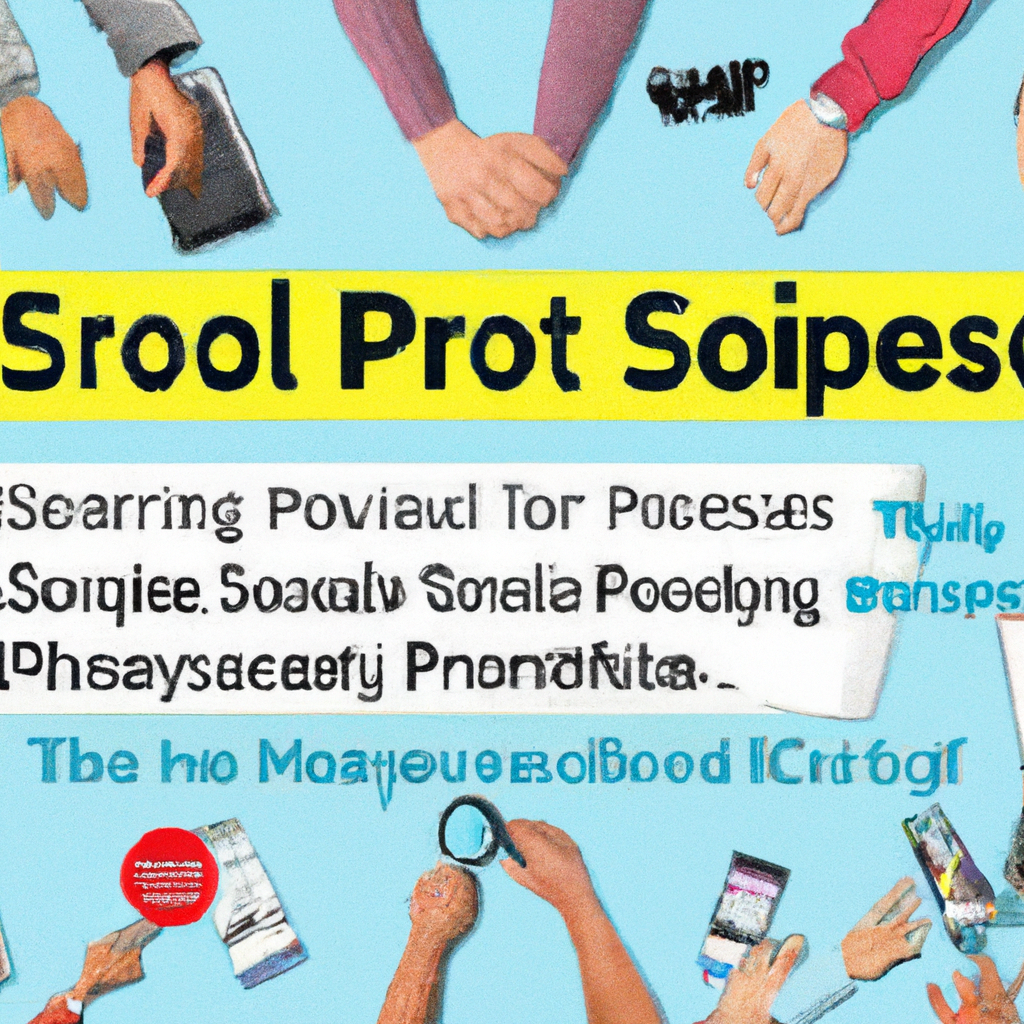Imagine this – you stumble upon a new product or service online, and you’re intrigued. But before taking the plunge and making a purchase, you hesitate. Will this actually deliver what it promises? Will it be worth your hard-earned money? That’s where the power of social proof comes in. By showcasing the experiences and opinions of others who have already tried and loved a product, social proof has the remarkable ability to build trust with potential customers. In this article, we will explore how you can leverage social proof to establish credibility, boost conversions, and ultimately win the trust of your customers.

Different Types of Social Proof
Testimonials from Satisfied Customers
One effective type of social proof is testimonials from satisfied customers. When potential customers see positive feedback from others who have already purchased and used a product or service, it instills confidence and trust. Including testimonials on your website or in marketing materials can help showcase the positive experiences of past customers, making it more likely that new customers will also have a positive experience.
Case Studies and Success Stories
Case studies and success stories provide detailed accounts of how a product or service has benefited a customer or client. These examples demonstrate real-life scenarios and show potential customers the tangible results they can expect by using a particular product or service. Sharing these stories can help build trust and create a sense of reliability and credibility.
Social Media Mentions and Engagements
In today’s digital age, social media has become a powerful tool for social proof. When a brand is mentioned or engaged with on platforms like Facebook, Twitter, or Instagram, it can have a significant impact on customer trust. Positive comments, likes, and shares from followers contribute to the perception of a brand’s popularity and reliability.
Influencer Endorsements
Influencer endorsements are a form of social proof where individuals with a significant online following promote a brand, product, or service. Influencers often have a loyal and engaged audience, making their endorsement a powerful tool to build customer trust. By partnering with influencers who align with your brand values and target audience, you can leverage their influence to enhance your credibility and reach.
Expert and Celebrity Recommendations
Expert and celebrity recommendations also play a crucial role in building customer trust. When an industry expert or well-known figure endorses a product or service, it adds a level of credibility and authority. Customers are more likely to trust the opinion of someone they perceive as knowledgeable or influential. Featuring endorsements from experts and celebrities can help build trust and establish your brand as a credible choice.
Importance of Social Proof in Building Customer Trust
Establishing Credibility
Social proof is vital in establishing credibility with potential customers. When they see positive feedback, testimonials, or endorsements from others, it reassures them that your product or service is legitimate and reliable. By leveraging social proof effectively, you can establish a strong foundation of trust and credibility for your brand.
Creating a Sense of Belonging
Humans have a natural desire to belong and be part of a community. Social proof can help create that sense of belonging by showing potential customers that others have already benefited from your product or service. When people see others like them enjoying the benefits of what you offer, they are more inclined to trust your brand and want to be part of it.
Reducing Perceived Risk
Many customers have concerns or doubts before making a purchase. Social proof can help reduce the perceived risk associated with buying a product or service by showing that others have had positive experiences. By showcasing testimonials, case studies, and reviews, you can alleviate customer concerns and increase their confidence in making a purchase.
Building Confidence and Reliability
Customer trust is built upon confidence and reliability. When potential customers see that others have had positive experiences with your brand, it increases their confidence in your product or service. Social proof helps establish your brand as reliable and trustworthy, making it more likely that customers will choose your offerings over competitors.
Psychological Principles Behind Social Proof
The Bandwagon Effect
The bandwagon effect is a psychological phenomenon where people are more likely to adopt a particular behavior or belief if they see others doing the same. When potential customers see positive social proof, such as testimonials or high engagement on social media, they are more likely to follow suit because they perceive it as the popular or desirable choice. Harnessing the bandwagon effect through social proof can significantly influence customer trust and behavior.
Informational Social Influence
Informational social influence occurs when people look to the actions and opinions of others to guide their own behavior, especially in situations where they lack knowledge or expertise. Social proof, such as expert recommendations or case studies, can serve as a source of information for potential customers. When they see others benefiting from your product or service, it provides them with valuable information that boosts their confidence and trust in your brand.
FOMO (Fear of Missing Out)
FOMO, or the fear of missing out, is a psychological principle that drives people to participate in or purchase something out of the fear of feeling left out. When potential customers see social proof indicating high demand or limited availability, it triggers their FOMO and increases their desire to be part of the experience. By leveraging FOMO through social proof, you can create a sense of urgency and increase customer trust in your brand.
Utilizing Customer Reviews and Testimonials
Displaying Positive Reviews on Website
One effective way to utilize customer reviews and testimonials is by displaying them prominently on your website. When potential customers visit your site, they can see firsthand the positive experiences others have had with your product or service. Displaying these reviews prominently on your homepage or dedicated testimonial page can instill trust and confidence in your brand.
Using Reviews on Product Pages
In addition to displaying reviews on your website, it is essential to incorporate them into individual product pages. When customers are browsing specific products, seeing reviews from other customers who have purchased and used that item can significantly impact their decision-making process. By including reviews and ratings on product pages, you provide valuable information and social proof that helps build customer trust.
Leveraging Review Platforms and Aggregators
Review platforms and aggregators, such as Yelp, Google Reviews, or Tripadvisor, are powerful tools for harnessing customer reviews and testimonials. These platforms are highly trusted and widely used by consumers when making purchasing decisions. By actively monitoring and responding to reviews on these platforms, you can improve customer satisfaction and build trust by demonstrating your commitment to addressing customer feedback.

Showcasing Case Studies and Success Stories
Highlighting Real-Life Examples
Case studies and success stories offer detailed accounts of how a particular product or service has benefitted customers. These examples provide potential customers with real-life scenarios and demonstrate how your offerings can deliver positive outcomes. By highlighting specific individuals or companies in your case studies, you create relatable and tangible examples that build trust with your target audience.
Demonstrating Positive Outcomes
When showcasing case studies and success stories, it is crucial to emphasize the positive outcomes achieved by your customers. Highlighting significant improvements, increased productivity, or other specific benefits helps potential customers envision how they could experience similar results by choosing your product or service. Demonstrating positive outcomes through case studies reinforces trust and confidence in your brand.
Providing Before and After Comparisons
Including before and after comparisons in your case studies adds a powerful visual element that reinforces the effectiveness of your product or service. By showcasing the transformation or progress made by a customer, you provide tangible evidence of the positive impact your offerings can have. This visual representation helps potential customers see the potential benefits for themselves and builds trust in your brand.
Harnessing Social Media Mentions and Engagements
Encouraging Customers to Share Experiences
To harness social media mentions and engagements, it is essential to encourage your customers to share their experiences with your brand on social platforms. Engage with your audience by asking for feedback, running contests or challenges, and featuring user-generated content. By actively encouraging customers to share their positive experiences, you not only generate valuable social proof but also foster a sense of community and loyalty.
Sharing User-Generated Content
User-generated content (UGC) is a powerful form of social proof that can significantly impact customer trust. When customers share their positive experiences with your brand, whether through photos, videos, or testimonials, it demonstrates authenticity and builds trust with potential customers. Sharing UGC on your social media channels and website shows that real people are enjoying and benefiting from your offerings.
Monitoring and Responding to Social Media
Monitoring social media mentions and responding to customer feedback is crucial for building trust and maintaining a positive brand image. Actively engage with your audience by responding to comments, addressing concerns, and expressing gratitude for positive feedback. By actively managing your social media presence, you demonstrate your commitment to customer satisfaction, which builds trust and loyalty.
Leveraging Influencer Endorsements
Identifying Relevant Influencers
When leveraging influencer endorsements, it is vital to identify influencers who align with your brand values and target audience. Look for influencers who have a genuine interest in your industry or niche and whose followers match your target customer demographic. By partnering with influencers who have credibility and influence within your target market, you can maximize the impact of their endorsement on customer trust.
Developing Authentic Partnerships
Authenticity is crucial when it comes to influencer endorsements. Build genuine relationships with influencers by providing them with value, engaging with their content, and genuinely appreciating their support. By developing authentic partnerships based on mutual trust and respect, you can ensure that the influencer’s endorsement resonates with their audience and enhances customer trust in your brand.
Amplifying Influencer Content
To maximize the impact of influencer endorsements, it is essential to amplify their content across multiple channels. Share their posts, videos, or reviews on your social media channels, website, and other marketing materials. By amplifying the influencer’s content, you not only extend their reach but also demonstrate that their endorsement is valued and trusted by your brand.
Capitalizing on Expert and Celebrity Recommendations
Using Expert Opinions and Testimonials
Expert opinions and testimonials carry significant weight when it comes to building customer trust. Seek out industry experts, thought leaders, or professionals who can provide their expertise and support for your product or service. Incorporate their opinions and testimonials into your marketing materials to showcase their endorsement and build trust with potential customers.
Leveraging Celebrity Endorsements
Celebrity endorsements can have a powerful impact on customer trust and brand perception. When a well-known figure endorses your product or service, it adds credibility and generates excitement among potential customers. Collaborate with celebrities who align with your brand values and target audience. By leveraging their influence, you can build trust and reach a broader audience.
Collaborating with Industry Thought Leaders
Collaborating with industry thought leaders is an effective way to build customer trust and establish yourself as a credible authority within your field. Seek out respected professionals or experts who have a significant influence and following in your industry. By collaborating with thought leaders through interviews, guest blog posts, or speaking engagements, you can leverage their expertise and enhance customer trust in your brand.
Building Trust through Social Proof on E-Commerce Platforms
Product Ratings and Reviews
On e-commerce platforms, product ratings and reviews play a crucial role in building customer trust. Potential customers rely heavily on the opinions and experiences of others when making purchasing decisions online. By actively encouraging customers to leave reviews and displaying ratings prominently, you provide valuable social proof that informs and reassures potential buyers.
Trust Seals and Certifications
Trust seals and certifications are visual indicators that your website and e-commerce platform are secure and trustworthy. These badges, such as SSL certificates or payment provider logos, provide additional reassurance to potential customers that their personal information and transactions are protected. By incorporating trust seals and certifications, you enhance customer trust and reduce perceived risk.
Social Login Integration
Implementing social login integration on your e-commerce platform can significantly impact customer trust. Social login allows users to log in or create an account using their existing social media credentials. This integration not only simplifies the registration process but also leverages social proof. By displaying the number of social media connections or friends already using your platform, customers feel more comfortable and confident in transacting with your brand.
Incorporating Social Proof in Marketing Materials
Including Testimonials in Ads and Promotions
Incorporating testimonials into your ads and promotions adds an extra layer of social proof. When potential customers see positive feedback from others while they are in the consideration or decision-making stages, it reinforces their trust and confidence in your brand. By including testimonials in your marketing materials, you increase the likelihood of attracting new customers and driving conversions.
Using Social Proof in Email Marketing
Email marketing provides an excellent opportunity to incorporate social proof. Include snippets of positive reviews, case study highlights, or expert endorsements in your email newsletters or promotional campaigns. By showcasing social proof directly in customers’ inboxes, you reinforce the benefits and credibility of your products or services, increasing customer trust and engagement.
Showcasing Social Proof in Videos
Videos are a powerful medium for showcasing social proof. Consider creating customer testimonial videos, case study videos, or videos featuring expert endorsements. By visually communicating the positive experiences and feedback of others, you provide potential customers with compelling evidence of your brand’s reliability and trustworthiness.
In conclusion, social proof is a powerful tool for building customer trust. By leveraging testimonials, case studies, social media mentions, influencer endorsements, and expert recommendations, you can establish credibility, reduce perceived risk, and create a sense of belonging. Understanding the psychological principles behind social proof, such as the bandwagon effect, informational social influence, and FOMO, allows you to effectively harness its influence. Incorporating social proof into your marketing materials and e-commerce platforms, including customer reviews and ratings, trust seals, and social login integration, further enhances customer trust. By utilizing social proof in your marketing strategy, you can build a strong foundation of trust and loyalty with your customers.











